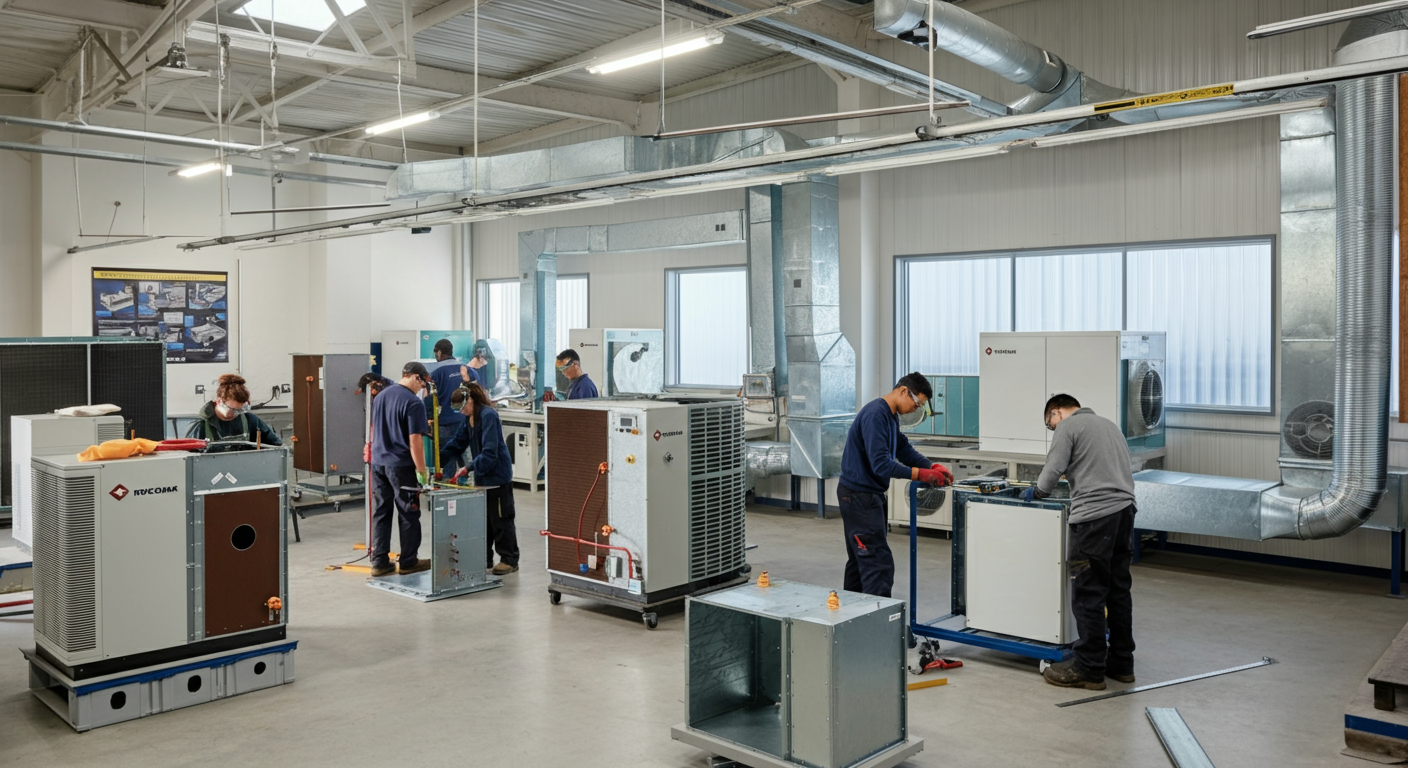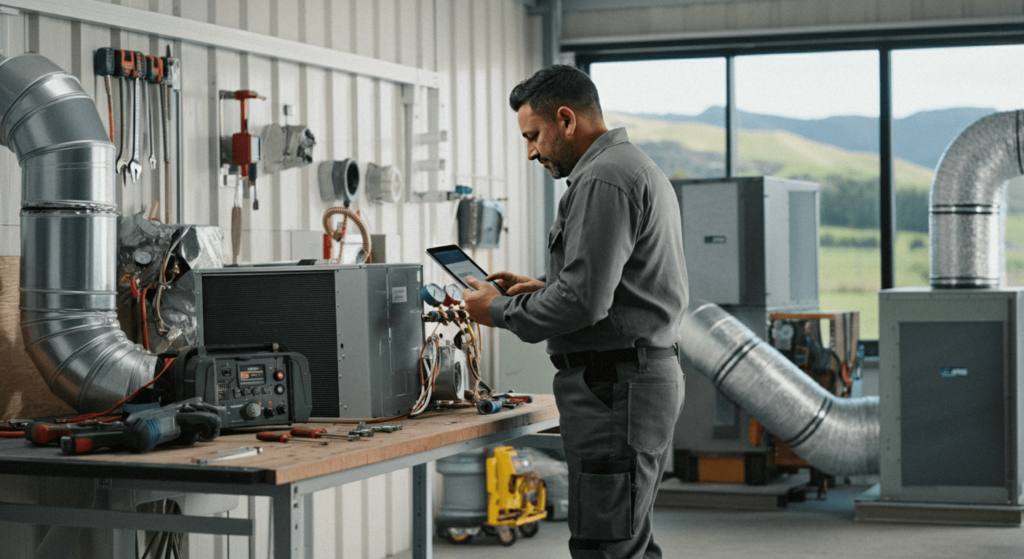HVAC Trade Schools in New Zealand: An Overview
In New Zealand, HVAC (Heating, Ventilation, and Air Conditioning) apprenticeships offer rewarding opportunities enabling individuals to gain practical experience while earning a recognised and marketable qualification. These programmes combine hands-on, on-the-job training with structured theoretical learning, preparing participants for a fulfilling and well-paid career.
New Zealand boasts several reputable trade schools and training programmes for those interested in HVAC. Below is an overview of key options available:
1. New Zealand Certificate in Refrigeration and Air Conditioning (Level 3)
Duration: Full-time for one year (34 teaching weeks)
Credits: 120.
Institutions:
Manukau Institute of Technology (MIT)
- Programme: New Zealand Certificate in Refrigeration and Air Conditioning (Level 3)
- Overview: This pre-apprenticeship qualification equips students with the practical skills needed to become refrigeration and air conditioning technicians. The course covers a wide range of topics, from installation to maintenance and repair of HVAC systems.
Southern Institute of Technology (SIT)
- Programme: New Zealand Certificate in Refrigeration and Air Conditioning (Trade Assistant) (Level 3)
- Overview: This course prepares students for the HVAC industry, focusing on both domestic and commercial equipment. It includes foundational knowledge necessary for a career in refrigeration and air conditioning.
Competenz
- Programme: New Zealand Certificate in Refrigeration and Air Conditioning (Trade Assistant) (Level 3)
- Overview: This entry-level qualification focuses on supporting qualified tradespeople through basic assembly, installation, and maintenance tasks performed under supervision.
2. New Zealand Certificate in Refrigeration and Air Conditioning (Trade) (Level 4)
Duration: Typically takes 3-4 years, often completed as part of an apprenticeship.
Institutions:
Competenz
- Programme: New Zealand Certificate in Refrigeration and Air Conditioning (Trade) (Level 4)
- Overview: Successful completion of this qualification fully equips candidates to be qualified refrigeration and air conditioning technicians. It entails finishing an apprenticeship and having twelve months of related work experience.
Unitec Institute of Technology
- Programme: Heating Ventilation and Air Conditioning (Part of the New Zealand Certificate in Automotive Electrical Engineering – Level 4)
- Overview: This programme is crucial because it offers basic concepts that can bring about specialization in HVAC, through other courses or by joining an industry as an apprentice.
3. Special programmes for Māori and Pasifika
Māori and Pasifika Trades Training (MPTT) is a collaborative initiative offering scholarships, mentoring, and cultural support to Māori and Pasifika students pursuing trades training in fields such as refrigeration and air conditioning
4. Other programmes
Unitec Institute of Technology
- Programme: Various trade courses, including HVAC-related qualifications.
- Overview: Offers hands-on experience focusing on practical skills in mechanical engineering and related fields.
Skillsure Academy
- Programme: Specialist HVAC training courses.
- Overview: Focuses on practical skills and knowledge needed for the HVAC industry. Their courses include a three-day installer course that emphasizes hands-on practice.
Online Learning Opportunities
Several institutions offer online HVAC programmes to accommodate various learning preferences. Johnson Controls provides self-paced courses on building automation systems and HVAC fundamentals, allowing professionals to enhance their skills from home. Skillsure Academy also offers online training focused on practical HVAC skills, including specialized installer courses. While traditional institutions like Manukau Institute of Technology and Unitec primarily offer in-person training, they may include online components or resources to support students. These options ensure greater flexibility for those looking to enter or advance in the HVAC field.
General Entry Requirements
1. Age Requirement:
Applicants must be at least 16 years old when beginning the programme.
2. Citizenship or Residency:
Applicants must be New Zealand citizens or hold permanent resident or refugee status.
3. English Language Proficiency:
If English is not the applicant’s first language, they are required to provide evidence of English proficiency, typically through an IELTS score:
- General or Academic score of 5 with no band score lower than 5
4. Educational Background:
Some programmes require completion of specifi educational qualifications, such as:
- NCEA Level 2 with specific credits in subjects such as mathematics, physics, or mechanical technologies.
- Completion of a pre-apprenticeship qualification in a building and construction field may also be accepted.
Key Considerations for HVAC Training
General Entry Requirements:
- Almost all Level 3 programmes have no set prerequisites for admission, and therefore can be taken by many learners.
- For Level 4 programmes, candidates normally require Level 3 qualification or prior working experience in the HVAC industry.Costs:
Costs:
Costs can vary significantly depending on the institution and programme level. For instance, Manukau Institute of Technology (MIT)- For domestic students, a cost of around NZD 7,900 for the Level 3 Certificate in Refrigeration and Air Conditioning.
Overview of HVAC Apprenticeships and Career Prospects
HVAC apprenticeships in New Zealand typically lead to the New Zealand Certificate in Air Conditioning and Refrigeration (Trade) Level 4, a qualification essential for becoming a fully qualified technician in the field. These apprenticeships generally span three to five years, depending on the individual’s prior experience and the specific training programme.
Apprentices gain hands-on experience in diverse settings, including residential and commercial structures, as well as specialised areas such as transport refrigeration. They are mentored by qualified technicians, combining practical on-the-job training with theoretical learning to build a comprehensive understanding of the trade. The workplace environment often requires flexibility, as locations may change frequently.
Key highlights of HVAC apprenticeships include:
- On-the-Job Training: Apprentices acquire practical skills vital to the HVAC industry while working under the supervision of experienced professionals.
- Certification: Successful completion of the apprenticeship leads to the New Zealand Certificate in Refrigeration and Air Conditioning (Trade) Level 4.
Apprentices typically start on minimum or training wages, with earnings increasing as they progress and complete units within their training programme. Fully qualified technicians earn an average annual salary of $50,000 to $95,000, with opportunities for experienced professionals to manage teams, establish their own businesses, or command even higher pay.
Recent data indicates a robust demand for HVAC apprentices in New Zealand, reflecting a strong job market. Employers often prefer candidates who have completed or are actively pursuing relevant qualifications.
An HVAC apprenticeship in New Zealand is an excellent pathway to a stable and rewarding career. It equips individuals with valuable skills, prepares them for in-demand roles, and provides access to a growing industry with significant career potential.




